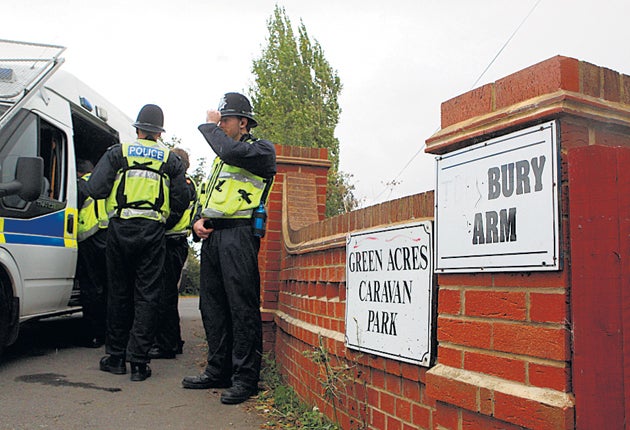Men rescued from squalid forced labour camp refuse to help police

Nine "modern day slaves" who were freed by police following a dawn raid on a Traveller site over the weekend have refused to co-operate with the investigation as detectives continue to unravel what they believe is one of the worst cases of forced labour in modern British history.
Bedfordshire police insist that they have dismantled a slavery ring operated by a "family-run organised crime" syndicate that forced vulnerable men to live in appalling conditions for little or no pay.
Four men, all from the same family of Travellers, were charged yesterday with slavery offences relating to four people found at the site in Bedfordshire.
Officers swooped on the Green Acres Caravan Park in Leighton Buzzard in the early hours of Sunday morning after months of undercover surveillance work sparked by a tip-off. They expected to find eight people but were instead confronted by 24 British and eastern European men living in filthy buildings ranging from dog kennels to sheds and horse boxes.
Detectives say gang masters targeted the men at soup kitchens, job centres and benefit offices with the promise of work but instead subjected them to a gruelling work regimen, shaving their heads on arrival and forcing them to labour for more than 12 hours a day for minimal wages. The youngest of those rescued is a 17-year-old boy who has been returned to his parents. At least one of those forced to work at the camp had been living there for 15 years.
But in an indication of how many of the men have been institutionalised by their conditions, Bedfordshire police yesterday admitted that nine of those rescued have declined to co-operate with the investigation. One of the men even returned to the Traveller site yesterday insisting that he had been happy to work there and that the police raid had been "heavy handed".
Experts working to combat slavery said it was often common for victims to empathise with their abusers. "We can't prejudge what has happened here," said Paul Donohoe, of Anti-Slavery International. "But you do find sometimes that institutionalisation... creates a situation where captives psychologically identify with their captors."
Initial reports suggested that police had been warned 28 previous times that captives were being held at the site. Yesterday officers stressed that such information had been a misunderstanding. Instead, they said, the investigation was sparked after captives escaped in April and told them that 28 people were still being held as slaves.
Officers yesterday said the remaining 15 men who were rescued were still being assessed at a medical centre. Some of those saved are so badly malnourished that a full meal could prove fatal until their bodies adapt.
Four men arrested during the raid were still being questioned last night while a heavily pregnant woman was released on bail. Officers are still trying to track down two more men.
The raid was one of the first of its kind to use new anti-slavery legislation. Until last year, police forces had to use human trafficking legislation, which was often difficult to prove.
The men arrested have been detained on suspicion of slavery and servitude offences under section 71 of the Coroners and Injustice Act. The maximum penalties for such offences range from seven to 14 years in jail.
Baroness Young, who tabled the amendment that brought in the new legislation, said the raid was proof that the police are starting to be proactive about slavery: "This is the first time the new legislation has been used in such a visible way. In an ideal world it wouldn't need to be used at all but sadly slavery is real and occurs in the UK."
Travellers groups have expressed concerns that the arrests, carried out in front of television cameras, will lead to a backlash against their community.
Slavery and the law
* Although slavery was banned in Britain 200 years ago it was only in April 2010 that a specific criminal offence was brought in making it illegal to hold another person in servitude.
* Until then, police were forced to use existing legislation such as false imprisonment and human trafficking to seek convictions.
* Ministers insisted that the current legislation was adequate but human rights groups and unions lobbied for change.
* An amendment to the Coroners and Justice Bill brought in two new offences – holding someone in servitude within their home (punishable by up to 14 years in prison) and forcing someone to work against their will (seven years in prison).
